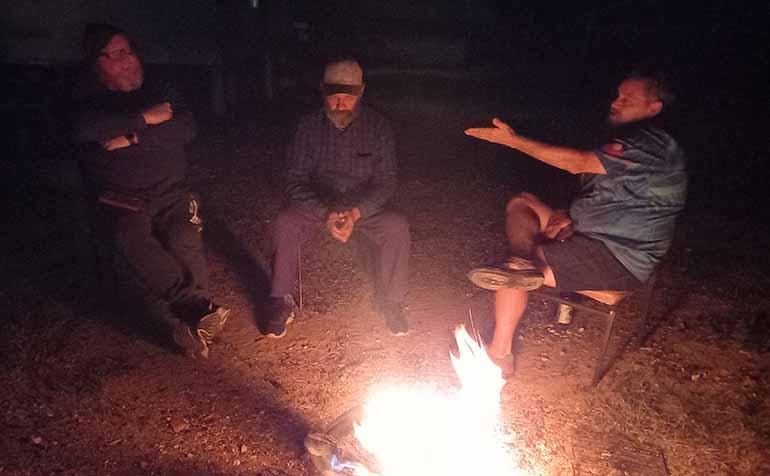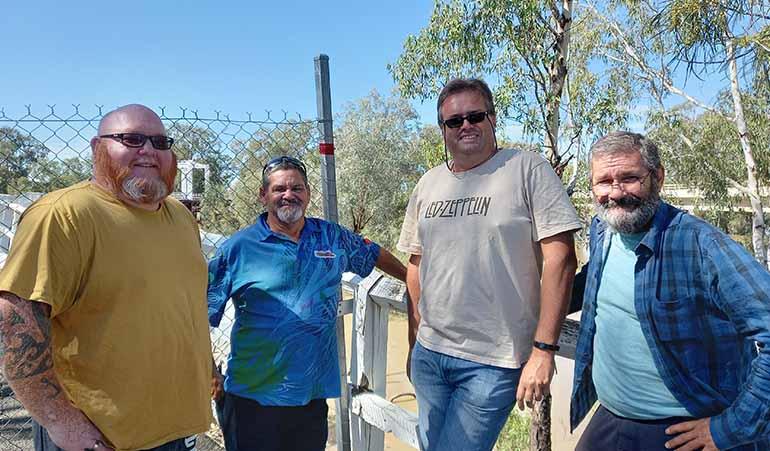Rene Woods smiles when he recounts taking the phone call asking if he’d take on the role as the First Nations member of the Board of the Murray-Darling Basin Authority (MDBA), the first in history. He knew it was going to be a big job, but soon learnt the breadth and depth of the organisation’s work.
First Nations lens already applied to much of the MDBA’s work
Rene says in his previous roles as chair and board member of Murray Lower Darling Rivers Indigenous Nations (MLDRIN) and engaging with the MDBA on several fronts, he considered he had some solid insights to the organisation’s work, particularly in the areas of water resource planning, Aboriginal partnerships, and environmental water.
“It really struck me when I came on board the amount of work that we do in different areas for Basin communities. Narrowing the focus to the First Nations water space, it’s not just the work of the Aboriginal Partnerships team but everyone within the organisation. It was a real eye opener in the first six months to see that many of the conversations internally with staff have a First Nations lens put on them. I did have a thought going into the role as to how much would be brought to the Authority Board about First Nations’ work and how much conversation there was at that level. In the first couple of meetings I was blown away by just how much conversation there was and had been in the past, and the supportiveness of the other board members.”
Board members’ passion for the Basin and Basin Plan evident
Rene said he had particularly enjoyed Authority Chair Sir Angus Houston’s leadership style.
“In the first 6 months it was just magnificent to watch how he operates as we were more able to meet with people in person. Stepping into a world where I’d only presented to the Authority 2 or 3 times in the past and then being in the room for every meeting, the expectation of how it all operated was with a bit of trepidation, but it was quite good once I was in there and listened to my fellow board members speak and could see their passion for the future of the Basin. This really settled the nerves in the first couple of Authority meetings."
Rene also paid tribute to outgoing MDBA Chief Executive Phillip Glyde who recently announced his retirement.
“I’ve been grateful for the opportunity to work with Phillip internally and externally over the past 6 years. He’s certainly leaving the Basin and the MDBA in a better position for the future. There have been some challenges, but he’s been the right man for the job.”
Low flows in the north a revelation
Rene has relished expanding his First Nations connections particularly in the northern Basin so he can provide an informed Basin-wide view of their struggles and aspirations, and where they want to head with their communities and nation groups.
“Going on the listening tour in the northern Basin with Sir Angus back in February 2021 was a really good opportunity to get out on Country and gain more of an on-the-ground perspective. There were many similarities between the north and south, but it also took me by surprise to see how stark the differences are in some respects as well. The change in the amount of water in the northern Basin system provided a marked contrast from the first 6 months of the year to the second, and from north to south. Seeing dry rivers and very little flows in the northern Basin in the first 6 months of my tenure was a revelation as I am used to seeing more flows in the south. Just to see that drought impact on the ground for First Nations and all Basin communities in the north was interesting to see firsthand.”

With 40+ First Nations, the role is a privilege and a responsibility to be proud of
Ensuring the varied perspectives of more than 40 First Nations groups from across the Basin are heard is a privileged responsibility Rene takes great pride in. He’s stepped into the position with decades of water experience behind him, as well as a deep personal connection and commitment to land and water.
“My job is to make sure that First Nations voices are heard and incorporated into as much water planning as possible and all aspects of the Basin Plan and have their outcomes met. If I come across a project or piece of the Basin Plan that doesn’t seem to have First Nations’ involvement, I ask the question about whether there’s been some input from the mobs on the ground such as NBAN (Northern Basin Aboriginal Nations), MLDRIN and others in that space to make sure they’re OK with it. It’s my role that the Nation Groups are seen and heard going forward, not to solve every problem. When I first joined the Authority, I was going to change the world, I hoped I could change everything, but I have since worked out I have quite a small remit as an Authority Member, including that the work we do is for all Basin communities. I am a First Nations representative first and foremost, and I live and breathe my culture, but I have to make sure I am looking out for everyone.”

Multi-generations needed to maintain momentum
When asked about what’s needed to maintain momentum in advancing First Nations’ water interests and rights, Rene says a multi-generational approach is a must. He’s seen his father, brother and other family members heavily involved in policy and at hands-on levels and is keen to involve upcoming generations to care for culture and Country as future custodians of traditional lands.
"I think the amendment to the Water Act to include a First Nations voice on the Board was a giant step forward, but we can still do more. Hopefully during my time and through the work of others we can make change for the next generation to come through and have even more input to water planning and environmental, social and cultural outcomes for communities right across the Basin. I’m here to do my part while my time and cultural responsibility is here but I want to make sure we’ve got stronger, younger generations of communities coming through to pick up the work that’s been undertaken by many people in the water arena right across the Basin.”
Ensuring communities are healthy, strong and sustainable
Managing his personal cultural obligations and his Authority role doesn’t bring a lot of friction for Rene.
“Walking in the two worlds of cultural responsibility of Country and my nation group and its communities isn’t dissimilar to making sure the water in the river and the rivers and communities are healthy, strong and sustainable and that the Basin can recover. I think that’s a different take on my cultural responsibility. At the end of the day there are some similarities there and yes, it does get tough sometimes, but having the support of friends and family behind me and people I can go to for a chat helps me to focus on what I’m doing culturally and with the work of the Authority.
One of the highlights of the year has been the Basin Knowledge Network and Regional Community Forums that were held online as COVID-19 restrictions meant meeting face to face wasn’t possible, a situation that Rene hopes will improve next year. The sharing of knowledge and expertise on those calls over the past 12 months, sharing lessons learnt and interaction with fellow community members has been a standout. Also having the regional footprint with staff in many parts of the Basin has helped keep in contact with community and it’s been a two-way process where there’s been more of a chance for locals to learn about the MDBA’s work.
Having plenty of water around in the later part of the year has been great to see with the environmental benefits flowing on to communities also. I’ve been lucky to see the resurgence of the Basin under these conditions and communities have a happier feel. Collaboration is still central to all that we do and that’s certainly something that Sir Angus brings to the Authority that I think communities are picking up on as well.
He really has brought that in and hopefully we can walk together for a better Basin going forward because if we don’t do that together we’re not going to achieve stronger, healthier communities and environment.”
Stronger together focus of future
Looking ahead, the next 12 to 18 months is set to bring a mix of opportunities and challenges in implementing the Basin Plan with a particular focus on Sustainable Diversion Limit Adjustment Mechanism (SDLAM) projects and continuing to build stronger community and other stakeholder relationships.
“I hope we get to spend more time in Basin communities to see, hear and touch what they live every day and allow them to see that we’re all working on the same path and are in it together. I think from a First Nations’ point of view there are some really good opportunities on the horizon with the implementation of water resource plans and other great work from the states that are going to benefit all communities not just First Nations. I think we can all benefit from having a stronger First Nations water sector.
I am looking forward to reconnecting after Covid disconnected a lot of people and getting out on country and spending more time in the Basin and giving back. With the improvement in First Nations environmental water as well as cultural flows outcomes I think there’s a great opportunity there to communicate the difference between them in partnership with First Nations groups. The education and capacity of communities to understand and build relationships with us through our regional connections will serve us well into the future.”
About Rene
Rene Woods is a Nari Nari man from south-west New South Wales. He has had a long involvement in Gayini (water) for Aboriginal people across the Basin. Rene is the first person to be appointed to the permanent First Nations Authority Member board position for a 4-year tenure.
Rene is a strong advocate for First Nations people in the Basin and has worked in communities in both the public and non-government organisation sectors of the Basin. He is currently employed by the Nature Conservancy Australia as a Conservation Officer and has seen what can happen for communities that have Gayini and land under their ownership and control. He believes that together we can achieve a strong healthy river system and healthier communities.
He previously held the position of chairperson of the Murray Lower Darling Rivers Indigenous Nations. He has also been vice-chair of the Nari Nari Tribal Council and held several other positions including with the New South Wales Department of Primary Industries Aboriginal Water Initiative and Murrumbidgee Valley Water New South Wales Customer Advisory Group. Rene was also a member of the National Cultural Flows Research Committee and Independent Panel for the Assessment of Social and Economic Conditions of Murray–Darling Basin communities.